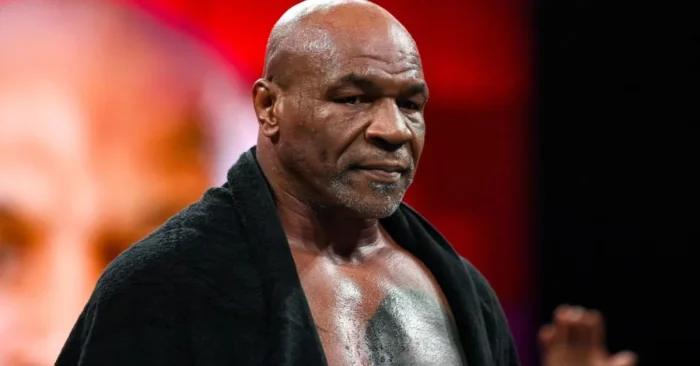Mike Tyson – Biography
Early Life and Family Background
Born on June 30, 1966, in Brooklyn, New York, Michael Gerard Tyson was raised in a challenging environment. His father abandoned the family early, leaving his mother Lorna Smith Tyson to raise Mike and his siblings in poverty. The family moved frequently, eventually settling in Brownsville, a neighborhood known for its crime and violence. By the age of 13, Tyson had been arrested more than 30 times for petty crimes. His life changed when he was sent to the Tryon School for Boys in upstate New York, where counselor Bobby Stewart introduced him to legendary boxing trainer Cus D’Amato. D’Amato became a father figure to Tyson and adopted him, instilling discipline and shaping his boxing career from a young age.
Early Career Struggles
Tyson’s amateur career was marked by both promise and aggression. He quickly built a reputation for his power and speed, winning gold medals at the 1981 and 1982 Junior Olympics. Turning professional at age 18 in 1985, Tyson began an astonishing streak of knockouts, many in the first round. His early career was carefully managed by D’Amato until his death in 1985. Tyson’s ferocity in the ring and his intimidating demeanor drew comparisons to boxing greats. Despite struggles with grief and growing fame, he remained undefeated and climbed the ranks at lightning speed. These early years laid the groundwork for what would become one of boxing’s most dominant runs.
Boxing Stardom and Controversies
Tyson made history in 1986 by becoming the youngest heavyweight champion at age 20 after defeating Trevor Berbick. His style—relentless, aggressive, and explosive—revolutionized boxing. Tyson unified the heavyweight titles and became the undisputed champion by 1987. However, fame brought turmoil. His tumultuous marriage to actress Robin Givens, legal disputes, and a split with longtime manager Bill Cayton and promoter Don King made headlines. In 1990, Tyson suffered a shocking defeat to Buster Douglas in Tokyo, ending his unbeaten streak. His career took a darker turn in 1992 when he was convicted of rape and sentenced to six years in prison, of which he served three. His image as a dominant champion was forever complicated by these personal and legal issues.
Comebacks and Later Career
Tyson returned to the ring in 1995 and briefly regained heavyweight titles before losing them to Evander Holyfield. Their 1997 rematch became infamous when Tyson bit off a portion of Holyfield’s ear, leading to disqualification and suspension. Despite this, Tyson remained a draw and continued fighting into the early 2000s, although with diminishing success. Financial troubles plagued him as he declared bankruptcy in 2003 despite having earned over $300 million during his career. His final fight came in 2005, marking the end of his tumultuous boxing career. In retirement, Tyson turned to entertainment, acting, and public speaking, reshaping his public persona with surprising vulnerability and humor.
Personal Life and Public Transformation
Tyson’s personal life has been marked by highs and lows. He has been married three times and is the father of seven children. The death of his daughter Exodus in 2009 was a deeply tragic moment. Tyson has spoken candidly about his battles with addiction, mental health, and his struggle to find peace after boxing. His 2008 autobiography and 2013 one-man Broadway show revealed a reflective, self-critical version of Tyson. Once seen as the sport’s most fearsome figure, he has evolved into a more philosophical, even spiritual individual, often advocating for personal growth and redemption. His candidness about his flaws has earned him a new level of respect from fans and critics alike.
Business Ventures and Philanthropy
In recent years, Tyson has rebranded himself through various business ventures. He launched Tyson Ranch, a cannabis company capitalizing on California’s legal marijuana industry. His podcast, “Hotboxin’ with Mike Tyson,” features in-depth conversations with celebrities and athletes, expanding his influence beyond boxing. Tyson has also appeared in films like The Hangover and in documentaries that explore his life story. He remains active in charitable work, supporting causes related to youth development, homelessness, and addiction recovery. These efforts reflect a transformed Tyson—one who seeks to give back and redefine his legacy through entrepreneurship, honesty, and service.
Conclusion
Mike Tyson’s life has been a saga of triumph, downfall, and redemption. From a troubled youth to the youngest heavyweight champion in history, and later a convicted felon who remade himself as an entertainer and businessman, Tyson’s journey defies simple categorization. His raw honesty, unique charisma, and undeniable talent have made him one of the most complex figures in sports history. As he continues to evolve, Tyson’s story remains a powerful testament to resilience and the human capacity for change.
Frequently Asked Questions
How old was Mike Tyson when he became heavyweight champion?
Mike Tyson became the youngest heavyweight champion in history at age 20 when he defeated Trevor Berbick in 1986.
What is Mike Tyson’s net worth?
As of recent estimates, Mike Tyson’s net worth is around $10 million, significantly lower than his career earnings due to past legal and financial troubles.
Did Mike Tyson go to jail?
Yes, Tyson served three years of a six-year sentence after being convicted of rape in 1992.
What is Tyson Ranch?
Tyson Ranch is Mike Tyson’s cannabis company, focused on growing premium marijuana and developing wellness products in the legal cannabis industry.
Is Mike Tyson still involved in boxing?
While retired from professional boxing, Tyson occasionally participates in exhibition bouts and remains active in the sport through commentary and mentorship.






